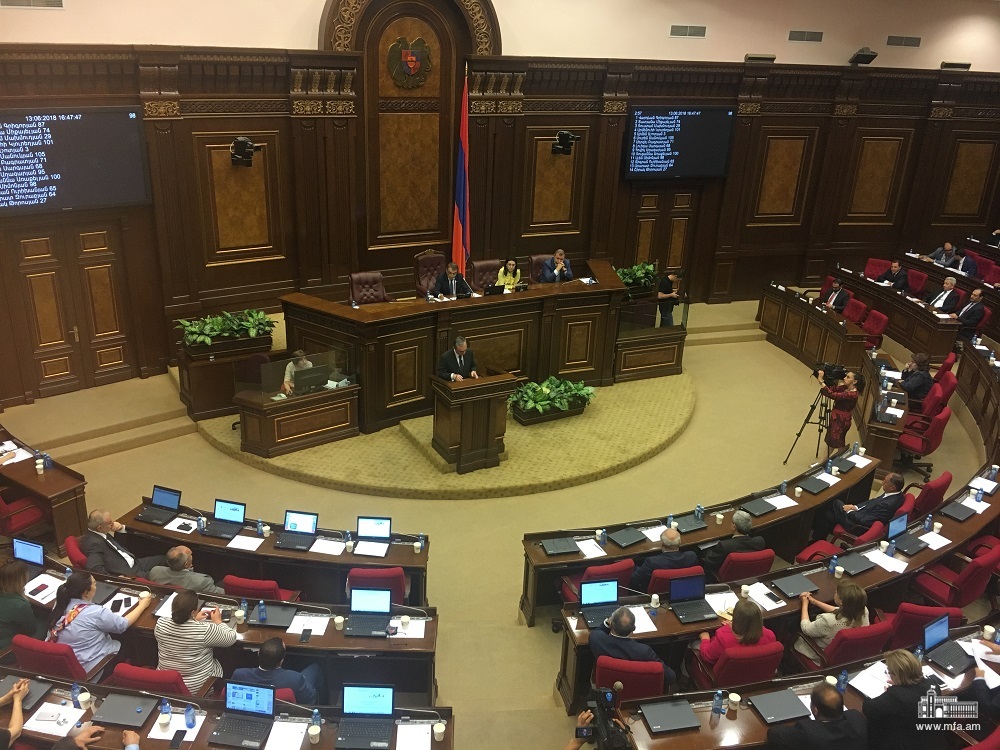Answers of Minister of Foreign Affairs Zohrab Mnatsakanyan in the National Assembly during the Q&A session with the Government
13 June, 2018Armen Ashotyan: My question is about the visit of the Minsk group Co-Chairs. We have got two releases through media - about your meeting and about the Prime Minister’s meeting. And the releases, to tell the truth, were not very much different from those published for years. I would like to ask you, distinguished Minister, using this high tribune, to reveal some details about the following questions. The first one is whether the Armenian side has voiced the new negotiation approaches, particularly, about our new strategy to acknowledge the Nagorno Karabakh Republic as a negotiating party? The second one is whether the Armenian side has raised the question on the accumulation of Azerbaijani military forces both in Nakhijevan and on the Artsakh front? And the third one is, what was the reaction of the Co-Chairs? Thank you in advance.
Zohrab Mnatsakanyan: Thank you, Mr. Ashotyan, for your question. Both your questions can be answered very briefly, yes, and yes. It is very natural, as we have quite clearly stated the priority of our government in the foreign policy programme, where Nagorno Karabakh has its clear place. We have stated our position, which refers to the consistency and continuity of our policy, including, with regards the Nagorno Karabakh issue, especially with regards the Nagorno Karabakh issue. We have stated our priority, that for Armenia in the peace process the issues of status and security are of exclusive importance. We are now in the process of re-engaging in the negotiations.
This is an introductory visit of the Co-Chairs. We are getting to know each other, exchange our viewpoints, and positions. In that respect we are quite clear, that the main points concern our commitment to the settlement of the issue only through peaceful means, and exclusively within the framework of the Minsk Group Co-Chairmanship. Special attention is paid also to the environment conducive to peace.
The notion of an “environment conducive to peace” is quite an extensive one, and it includes the actions that attest to the opposite as well. You mentioned about a number of developments directly on the Line of Contact. We drew the attention to them and underscored that what has happened two days ago is totally unacceptable. That victim has a name – Vahagn Еloyan, and it is an immense loss for us. This affects the negotiation process in an absolutely negative way. it’s also having an adverse impact on the principle which is very important for us - an environment conducive to peace. This cannot go unnoticed and not affect our positions.
Concerning the reactions of the Minsk Group Co-Chairs, I should say that we still continue our meetings. We are trying to use these days with maximum efficiency to better know each other, to convey the logic, the nuances of our positions, and approaches with respect the whole process. We are preparing for the next stages. This is a negotiations process, where Armenia continues to be engaged. And this will continue to be so. We are quite confident that what we speak about clearly reflects the continuity of our policy. Thank you.
Armen Ashotyan: Thank you, Minister. The official releases did not contain what you have revealed today, and this was the reason for my question. If possible, from now on, please, go beyond the dry administrative and diplomatic language, and share a little bit more information with the public, of course within the limits permissible in the negotiation process. I would particularly like to commend that Vienna, St. Petersburg and Geneva summits were mentioned also in official press releases. I highlighted this point also yesterday, during the statements time, as it is for the first time that the new government in its references to foreign policy mentions this, which, I believe, regardless of future scenarios, is very important also from the viewpoint of restoring the environment you have mentioned.
Taking into consideration that parliamentary diplomacy always served and will continue serving the pursuit of a general national and state interest, in particular, in June we have a plenary session of the Eastern Partnership Parliamentary Assembly (EURONEST), and the Parliamentary Assembly of the Council of Europe, in July we have the session of the OSCE Parliamentary Assembly, I would like to ask you to follow up on my proposal, which you have previously accepted, and to organize a close discussion on the current phase of the Nagorno Karabakh conflict settlement not only in the Committee, but also involving the heads of respective parliamentary delegations, so that on the Nagorno Karabakh issue we could be united, robust and, as it is said, “dukhov”/vigorous.
Zohrab Mnatsakanyan: Thank you, Mr Ashotyan. Once again, I would like to first reiterate my gratitude for our cooperation on the parliamentary platform. I definitely remain committed to this cooperation and I very much appreciate your contribution to this process.Certainly, we will continue this dialogue, in order to use the parliamentary platform as effectively as possible for our national interests. Thank you.


